Introduction
Access to efficient information retrieval has become the cornerstone of a successful business. In today’s ever-changing digital ecosystem, having easy access to accurate and up-to-date information is critical for developing highly efficient teams.
Employees are like a company’s internal customers. Whether employees operate in a customer-facing or non-customer-facing workplace, empowering your employees with relevant and up-to-date information is a prerequisite for productivity and efficiency.
And, how does one do that? Enter Enterprise Search.
Enterprise Search Definition
Enterprise search refers to the capability of an organization to index data from any internal data source and deliver the most relevant information to the user. The search results encompass active directories, databases, and the local intranet, enabling the retrieval of data and information from various sources.
In this blog post, we will help you comprehend the potential of a technology that can change data chaos into structured information at your fingertips. We will look at how it works, and the incredible benefits a fast enterprise search engine has to offer. We will also discuss the future trends and how enterprise search software can efficiently streamline knowledge management in an enterprise.
Enterprise Search Software: What’s in it for me?

The basic purpose of enterprise search is to provide users with the information they need to do their tasks efficiently and effectively. It presents information and data from an organization’s internal systems, databases, and repositories. Consider it a personal workplace assistant, searching through a treasure trove of documents, emails, reports, customer information, and product data to find what’s needed.
Ideally, top enterprise search engines respond to common questions like, “Where’s the marketing report I need for the meeting?” along the lines of “What did the marketing team say about our new product launch?”. With enterprise search, the answers are only a few keywords away. Companies can increase efficiency, break down information silos, and boost cooperation. They can ensure that vital information is easily accessible to personnel from various departments and functions.
Furthermore, enterprise search technologies are specifically developed to address the special issues of finding information in a complicated corporate setting. They look at solutions that are scalable to support massive datasets and can connect to a variety of data sources and file formats.
These tools frequently include complex capabilities such as faceted search, content classification, real-time indexing, and predictive search suggestions. These simplify the search process and produce more accurate results. At its root, business search is the organizational secret that boosts productivity and encourages cooperation.
Benefits of Introducing an Enterprise Search Software into Your Business
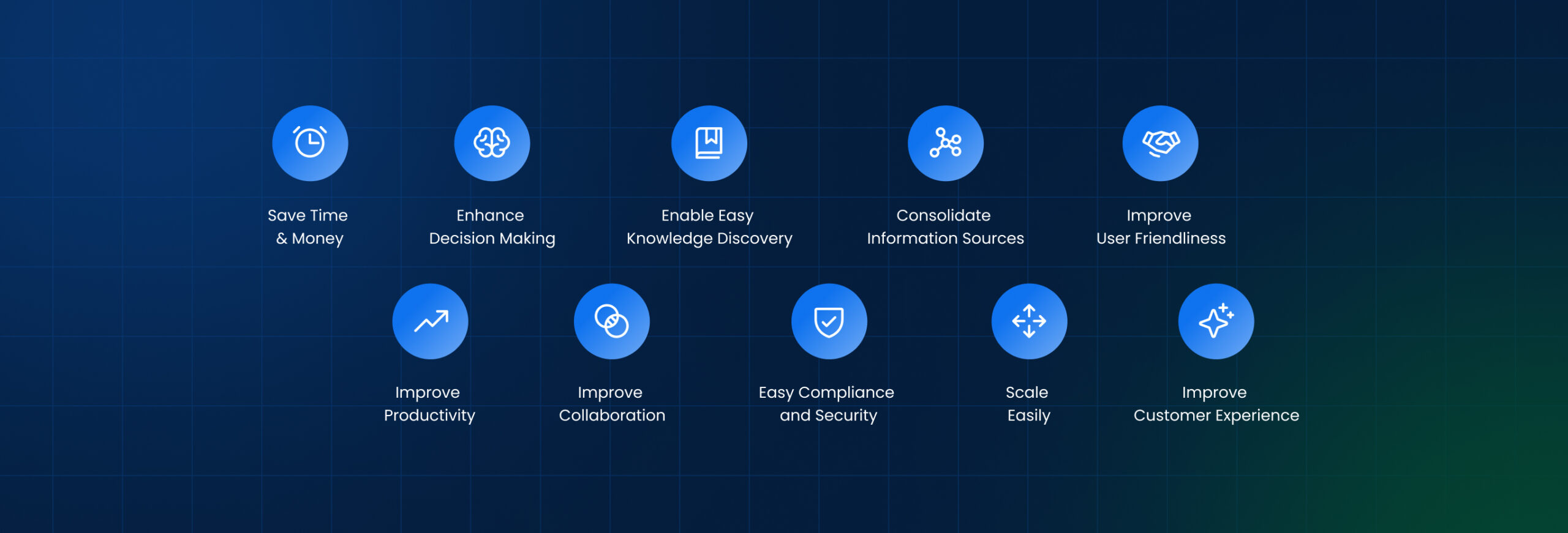
Intelligent enterprise search engine technology is constantly transforming the way businesses search and access their data. Below are just some of the benefits that you can expect by implementing an enterprise search engine into your business:
Save Time & Money:
Enterprise search saves employees time and money by providing instant access to important information without the need to search various sources. This efficiency translates into cost savings because staff spend less time on information retrieval duties.
Improve Productivity:
Best enterprise search engines promise to improve staff productivity by centralizing and streamlining information searches. Team members can rapidly access the information they require to execute tasks, make educated decisions, and collaborate productively.
Enhance Decision Making:
Rapid access to accurate and up-to-date information improves decision-making at all levels of the company. Enterprise search systems can give decision-makers complete information, allowing them to make better informed and strategic decisions.
Improve Collaboration:
Enterprise search features information sharing and access among team members, leading to increased cooperation. This is especially useful in large organizations or those with dispersed teams, where smooth cooperation can be difficult without an effective search tool.
Enable Easy Knowledge Discovery:
Enterprise search engine features unlock information and insights from large databases. By indexing and arranging various information sources, it assists employees in discovering vital information that would otherwise go overlooked.
Consolidate Information Sources:
Enterprise search integrates and consolidates information from multiple sources, including databases, documents, and emails. This guarantees that users receive a single, comprehensive view of pertinent data without having to go through multiple programs.
Easy Compliance and Security:
A well-implemented corporate search system helps firms meet compliance standards by securing sensitive information and limiting access to authorized individuals. This is critical for businesses with stringent regulatory requirements.
Improve User Friendliness:
Modern workplace search systems offer intuitive interfaces and user-friendly features, allowing employees to easily explore and use the system. This accessibility promotes a positive user experience.
Scale Easily:
Enterprise search solutions can scale and adapt to the needs of growing enterprises. They can handle an increasing volume of data and users, ensuring that search functionality stays reliable and effective.
Improve Customer Experience:
Enterprise search improves customer and employee experience by providing prompt and accurate responses to searches in customer-facing apps. Employees report increased job satisfaction when they can conveniently access the information they need to execute their tasks.
Use Cases of Enterprise Search
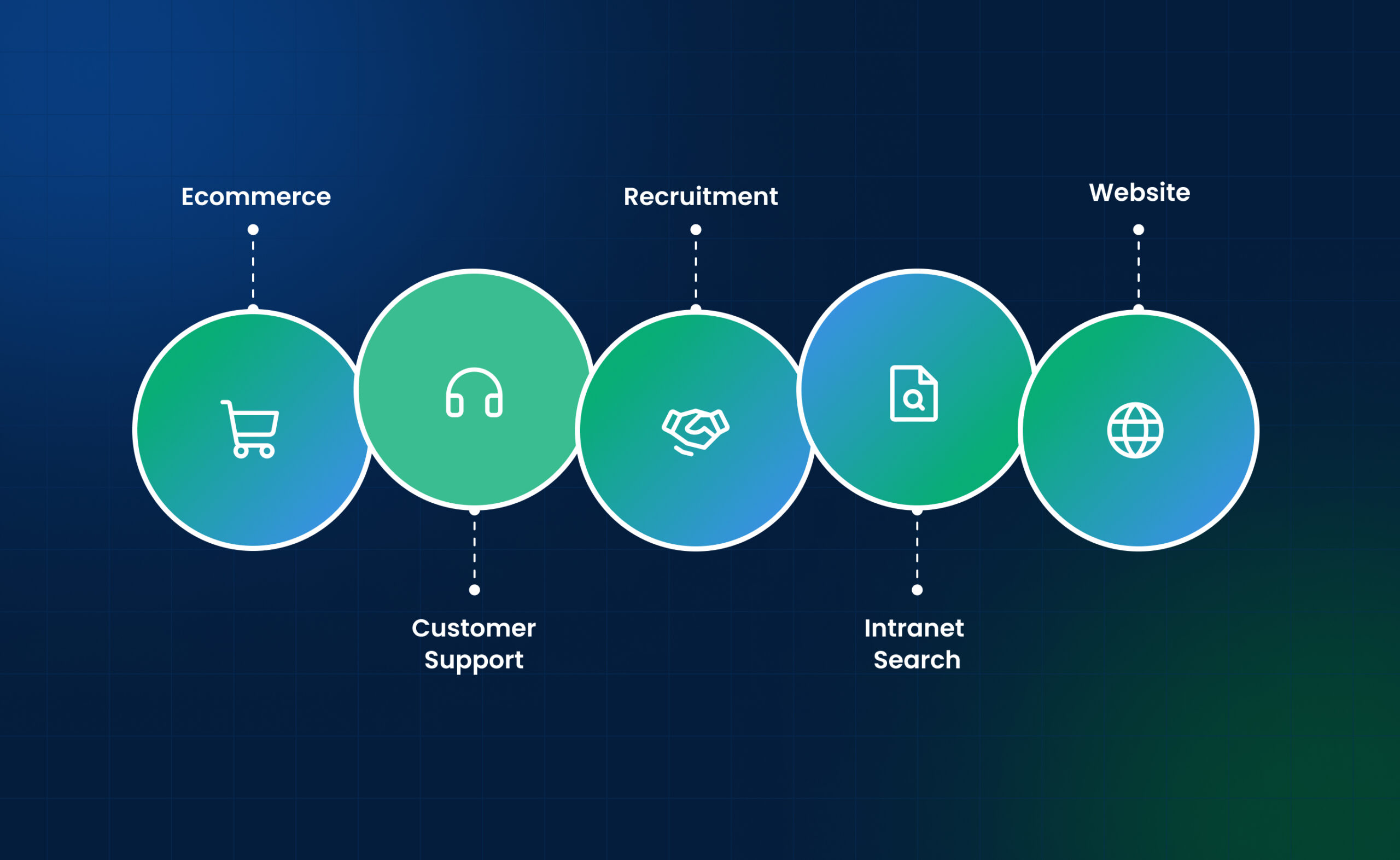
In a contemporary business environment, an enterprise search engine has many use cases, some of the important ones being listed below:
Ecommerce:
Intelligent enterprise search plays a vital role in extracting the accurate product related information in real-time. Enterprise search features enhance the user experience by enabling efficient information discovery. Users can easily find products based on their recommendation and preferences. Enterprise search engines can also help in facilitating quick access to real-time inventory data, monitor stock levels and streamline order fulfillment.
Website:
For content heavy websites, enterprise search engine features make sure that the visitors quickly find relevant information such as blogs, articles, case studies or any other form of multimedia content. An efficient search engine functionality has the ability to enhance the overall experience of a user. Additionally, users can bypass complex menus and directly search for the content they seek, improving overall user satisfaction.
Customer Support:
A fast enterprise search engine plays a vital role in customer support by allowing easy access to knowledge bases. A customer support agent can leverage an enterprise search engine by retrieving relevant information to address any queries which further leads to faster issue resolution. In customer support systems, managing and tracking support cases is critical. Enterprise search assists in retrieving and organizing case-related information, ensuring that support agents have the necessary details at their fingertips.
Intranet Search:
In an organization, employees often need access to internal documents, procedures and policies. Enterprise search simplifies this process by providing a unified platform for searching across various document repositories, fostering collaboration and information sharing. It also allows employees to connect with their colleagues regarding specific skills or knowledge, encouraging a collaborative and knowledge sharing environment in the workplace. Large organizations benefit from enterprise search for locating internal expertise.
Recruitment:
An enterprise search engine plays a crucial role in the recruitment process, it can help in shortlisting candidates based on their skill, qualifications or experience. This functionality enables a speedy hiring process and allows the recruits access to a pool of potential candidates. A top enterprise search backed by advanced text recognition features can analyze resumes, candidate profiles and extract relevant information. This further helps in streamline the entire process of recruitment and allows the recruiter to single out candidates that meet the job requirement the best.
What are the Types of Enterprise Search?
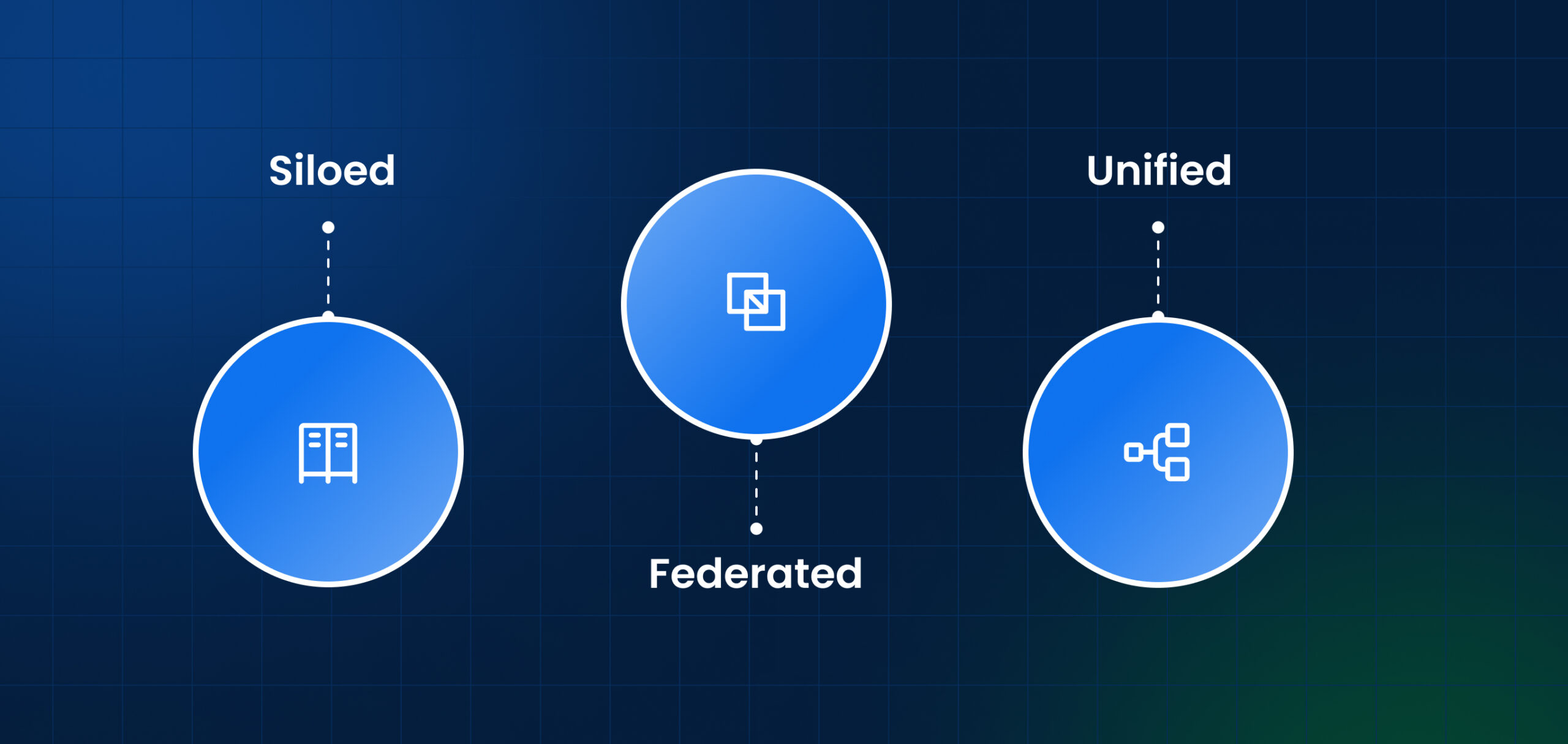
To help you understand the following terms in a simpler, let’s take a look at:
Siloed:
Traditional approach with isolated data repositories, limiting cross-system search. Imagine your information is stored in separate rooms that don’t talk to each other. Siloed is like having these isolated rooms, making it difficult to find things because you have to check each room separately.
Federated:
Integrates results from diverse sources for comprehensive search across platforms. Now, think of your information as friends who have different pieces of the puzzle. Federated is like gathering information from all your friends to solve the puzzle. It brings together results from different places, so you get a complete picture without having to go to each friend individually.
Unified:
Provides a centralized and streamlined search experience across various data repositories. Unified is like having a central hub where everything is organized. Instead of scattered rooms or friends, you have a single place to search. It’s like having one super-organized friend who knows where everything is, making it easy for you to find what you need.
How Enterprise Search Works: A Step by Step Understanding of the Process
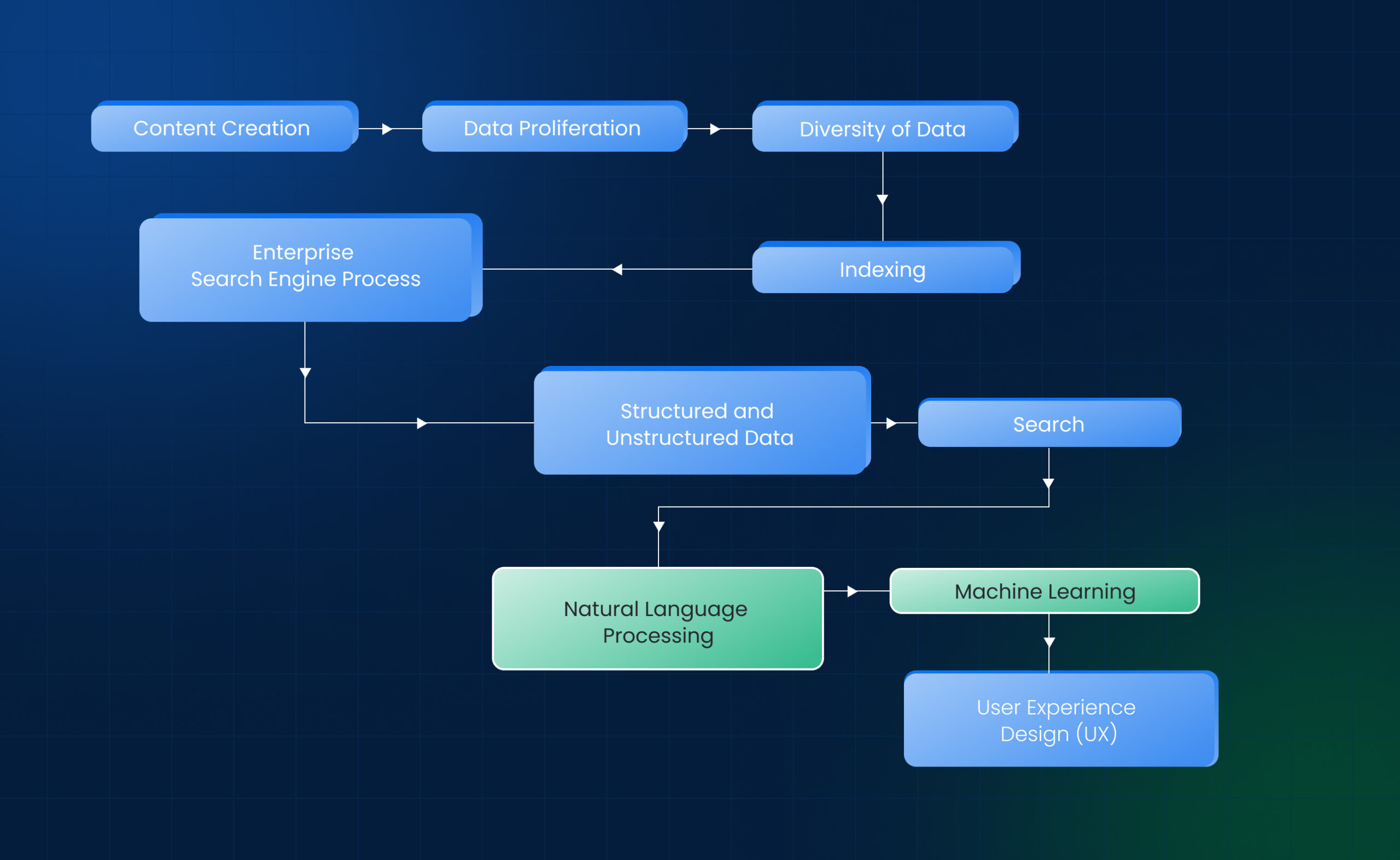
Content Creation:
Content is the raw material for enterprise search.More data is generated and needs to be analyzed, structured, and classified.
Data Proliferation:
Data becomes pervasive as the organization grows.Proliferation of product information, process details, marketing content, etc.Content created by different teams spreads across the enterprise.
Diversity of Data:
Information within large organizations is diverse and fragmented.Hosted on various repositories and enterprise applications.Includes CMS’s, ERP, CRM, RDBMS’s, file systems, data lakes, email systems, websites, intranets, social networks, and private/public cloud platforms.
Structured and Unstructured Data:
Data comes from various sources. Structured and unstructured data are stored in different “containers.”
Enterprise Search Engine Process:
Exploration:
Enterprise search engines crawl all data sources. Gather information from internal and external data sources.
Indexing:
Analysis and enrichment of recovered data.Tracks relationships and stores results for quick retrieval.
Search:
Employees request information in their native languages.Search platform offers relevant answers based on the query.Consider the employee’s work context and search history. Involves techniques like NLP and Machine Learning.
Natural Language Processing (NLP):
NLP involves interactions between humans and computers using natural language. Aims to make sense of human languages for valuable processing.
Applies AI to allow systems to learn and improve from experience. Enables systems to access and utilize data for learning without explicit programming.
User Experience Design (UX):
UX design focuses on creating products with relevant and meaningful experiences for end users. Encompasses branding, design, function, and usability.
Future Trend in Enterprise Search
Efficient information retrieval is going to play the key role in determining the success of digital businesses. Enhanced user experience leads to enhanced productivity and work efficiency.
The digital landscape is constantly evolving, and thanks to Generative AI, the word innovation has a new meaning now. Similarly, in the landscape of enterprise search engines, the implication of LLMs (Large Language Models), machine learning, natural language processing and vector data bases is going to completely transform the definition of user experience. Undoubtedly, enhanced search capabilities lead to better results which further increases engagement and productivity.
The next step in the domain of enterprise search seems to be dominated by Generative AI technology that enables intent prediction and understanding of the user behavior. Which will help in delivering highly specific responses to queries. Additionally, Vector databases will also play a role in the future of enterprise search. Vector database-integrated business search can provide a multi-modal search experience by allowing for more complicated data retrieval beyond keywords and synonyms.
Why Leena AI Stands as the Most Superior Knowledge Management Solution?
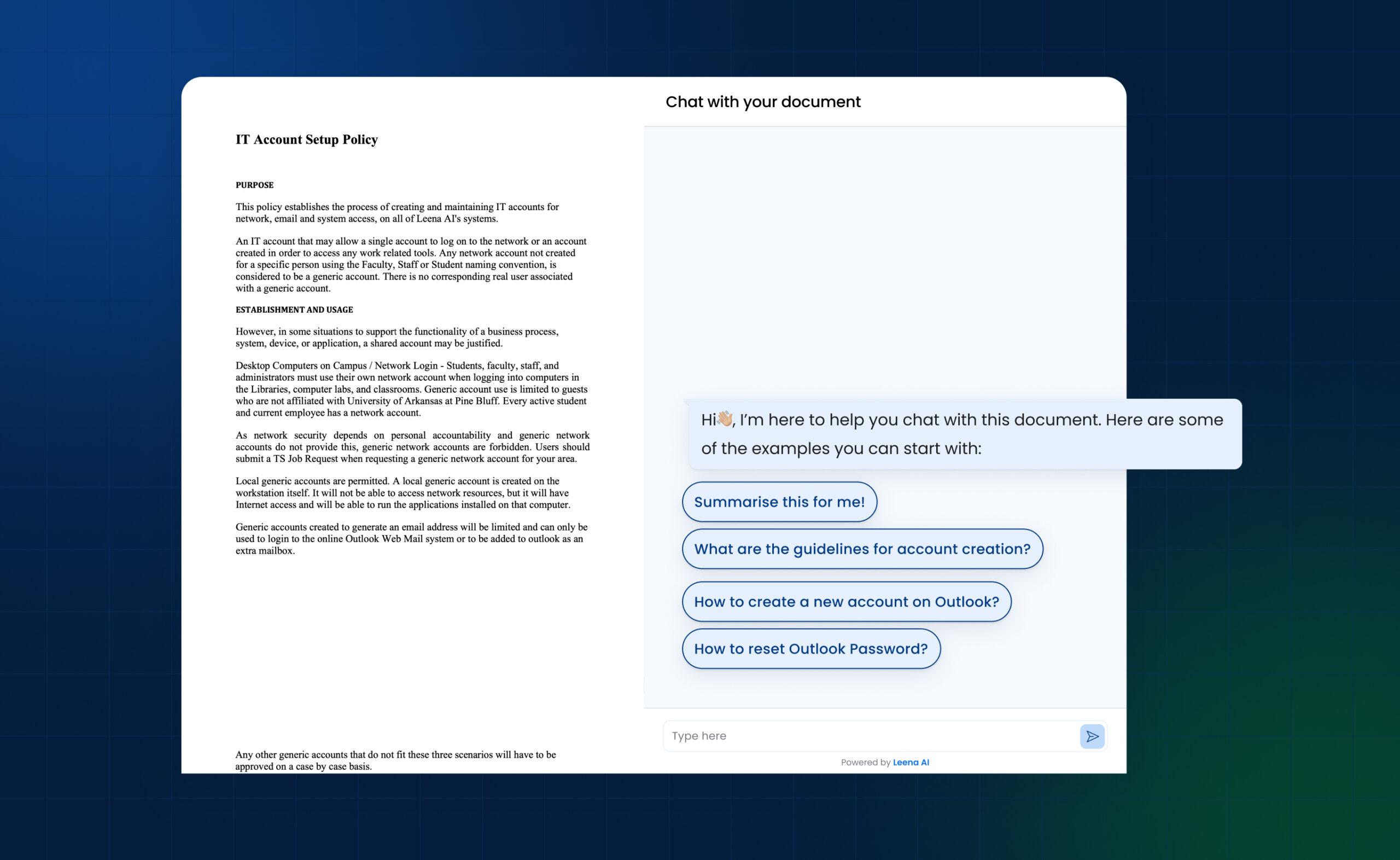
Leena AI emerges as the epitome of excellence in the realm of knowledge management, offering unparalleled advantages that set it apart from other solutions.
Efficient Centralization with Advanced Parsing:
Leena AI adopts a robust strategy of pulling all knowledge articles into a central system for pre-processing, surpassing the slower alternative of making real-time API calls. The parsing phase, often a bottleneck, is streamlined by Leena AI’s specialized parser model, achieving an impressive Mean Average Precision (MAP) of 95+. In contrast, open-source alternatives typically hover around 90, ensuring superior accuracy in parsing complex elements like tables and images.
Multimodal Support for Enhanced User Experience:
In an enterprise environment rich with visual content, Leena AI simplifies the handling of images and videos in knowledge articles. While open-source parsers struggle with presenting visual content in responses, Leena AI seamlessly integrates support for images, ensuring that responses include relevant visuals. Additionally, its out-of-the-box integrations with Learning Management Systems (LMS), like Docebo, make the inclusion of videos as a knowledge source effortless, allowing users to pinpoint relevant moments.
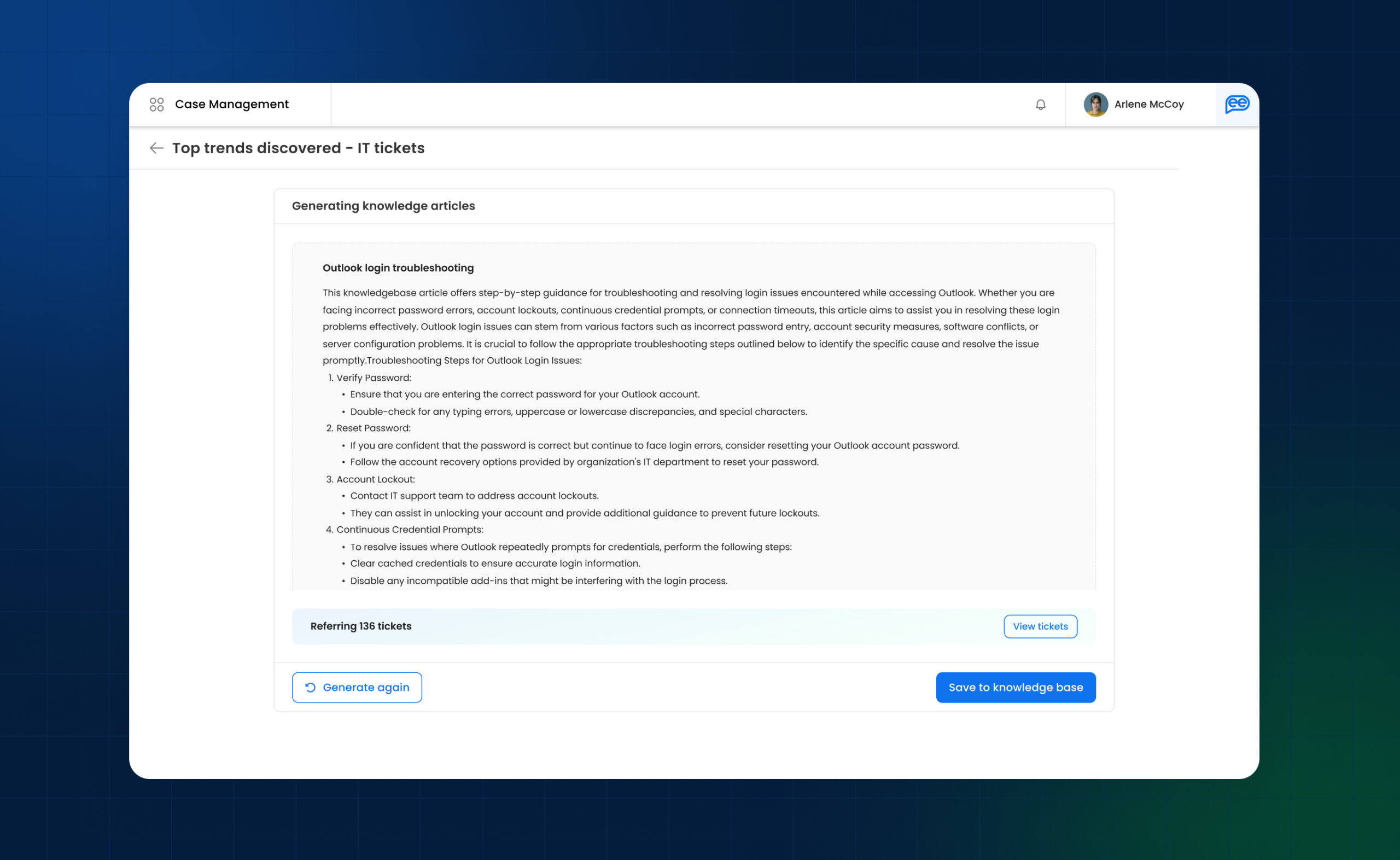
Streamlined Chunking, Vector Embedding, and Storage:
The process of breaking down knowledge articles into smaller, manageable chunks and creating embeddings is essential for effective processing. Leena AI not only handles this seamlessly but also eliminates the need for manual coding, ensuring a smooth transition from parsing to storing embeddings in a vector store. This level of automation is a distinct advantage, especially for large enterprises dealing with an extensive knowledge base.
Efficient Retrieval and Re-ranking:
Leena AI simplifies the intricate process of retrieval and re-ranking by making both models readily available. Its virtual assistant effortlessly converts questions to vector embeddings, identifies top relevant chunks, and employs a re-ranker model for optimal organization based on relevance. The availability of these models without the need for additional coding sets Leena AI apart, ensuring a hassle-free experience for users.
Seamless Integration with Enterprise Search:
The synergy between Leena AI’s WorkLM™ Knowledge Management system and Enterprise Search capabilities creates a powerful ecosystem. Leena AI’s enterprise search software, powered by Generative AI, contributes to 100% automated knowledge creation and management, resulting in a 90% faster access to information for employees and a remarkable 3x boost in team productivity and efficiency. The incorporation of advanced Generative AI capabilities ensures precise query intent, human-level reasoning, and intelligent knowledge dissemination.
Comprehensive Solution Tailored for Large Enterprises:
Leena AI presents a holistic and proven solution tailor-made for the unique needs of today’s fast-paced digital landscape. With a solid track record, it stands as a dependable and scalable choice, particularly well-suited for large enterprises. Its multifaceted approach, addressing parsing, multimodal support, chunking, vector embedding, retrieval, and re-ranking, showcases how it can revolutionize knowledge utilization and optimization comprehensively.
In essence, Leena AI’s comprehensive suite of features, from efficient parsing to advanced multimodal support, streamlined chunking and embedding processes, and seamless integration with enterprise search, positions it as the most superior knowledge management solution. Its commitment to innovation, automation, and user-friendly experiences ensures that organizations can harness the full power of AI-driven knowledge management effortlessly and effectively.
Learn More About Our Gen-AI Powered WorkLM™
Schedule a demo todayFrequently Asked Questions
What is enterprise search?
Enterprise search refers to the process of searching for information within an organization’s internal data repositories, databases, and other knowledge sources. It aims to provide users with quick and relevant access to information, documents, and data assets that are scattered across various platforms within the enterprise.
What is an enterprise search engine?
An enterprise search engine is a specialized software tool designed for searching, retrieving, and organizing information within an organization’s internal databases, documents, and repositories. It enables users to efficiently locate and access relevant data, promoting collaboration, productivity, and informed decision-making.
What is AI enterprise search?
AI enterprise search integrates artificial intelligence (AI) technologies into the search process, enhancing the efficiency and accuracy of information retrieval. AI algorithms analyze user behavior, understand natural language queries, and continuously learn from interactions, delivering more personalized and contextually relevant search results over time.
What is enterprise search in AI?
Enterprise search in AI involves leveraging AI technologies, such as natural language processing, machine learning, and deep learning, to optimize the search experience within an organization. It goes beyond traditional keyword-based searches, providing intelligent insights, context-aware results, and personalized recommendations based on user preferences.
Why does an organization need enterprise search?
Organizations need enterprise search to streamline information retrieval, enhance collaboration, and boost productivity. It ensures that employees can access relevant data quickly, facilitates knowledge sharing, and contributes to informed decision-making. Effective enterprise search also promotes compliance by providing a centralized and secure way to manage and retrieve sensitive information.
What is the difference between web search and enterprise search?
Web search and enterprise search differ significantly in their scope, purpose, context, and functionality. Web search, epitomized by popular search engines, aims to retrieve information from the vast expanse of the World Wide Web, covering a diverse array of topics for a broad audience. In contrast, enterprise search is tailored to an organization’s internal needs, focusing on retrieving specific information within its databases, documents, and knowledge repositories. While web search provides generalized results, enterprise search offers a more personalized and context-aware experience. It takes into account user roles, preferences, and historical interactions to deliver relevant information to employees within the organization. Moreover, enterprise search places a premium on security, access controls, and compliance with organizational policies, ensuring the protection of sensitive information. The user interface for enterprise search is often designed with organizational needs in mind, incorporating advanced features and customization options for a more specialized and efficient user experience.






